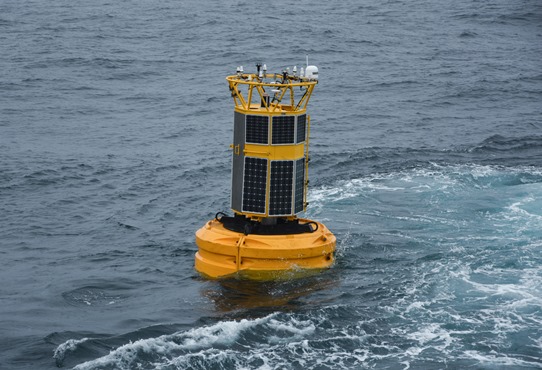“It is only in the last 20 years that experts have begun to understand the pivotal role of the ocean in determining climate and weather.”

Dr Paul Connolly, CEO of the Marine Institute.
Oceans of Learning is a 10-week series in which the Marine Institute and partners celebrate the ocean and our connection to the sea, by sharing news and offering online activities, videos, and downloadable resources on a new marine topic each week.
Ocean climate work is vital in providing the basis for how effective policies can be made to address a range of issues and challenges – such as changing ecosystems, food security, sea-level rise, and extreme weather events.
The focus in Oceans of Learning this week is on ‘Changing Ocean Climate’.
Our ocean and climate are inextricably linked – the ocean plays a crucial role in the global climate system in a number of ways. These include absorbing excess heat from the atmosphere and absorbing 30 percent of the carbon dioxide added to the atmosphere by human activity. But our marine ecosystems are coming under increasing pressure due to climate change.
The Marine Institute, with its national and international partners, works to observe and understand how our ocean is changing, and analyses, models, and projects the impacts of our changing oceans. Advice and forecasting projections of our changing oceans and climate are essential to creating effective policies and management decisions to safeguard our ocean.
Dr Paul Connolly, CEO of the Marine Institute, said:
“Our ocean is fundamental to life on earth and affects so many facets of our everyday activities. One of the greatest challenges we face as a society is that of our changing climate. The strong international collaborations that the Marine Institute has built up over decades facilitates a shared focusing on our changing ocean climate and developing new and enhanced ways of monitoring it and tracking changes over time. Our knowledge and services help us to observe these patterns of change and identify the steps to safeguard our marine ecosystems for future generations.”
Annual Ocean Climate Research Survey

The M6 weather buoy being deployed on the Marine Institute’s annual ocean climate survey.
The Marine Institute’s annual ocean climate research survey, which has been running since 2004, facilitates long term monitoring of the deepwater environment to the west of Ireland.
This repeat survey, which takes place on board RV Celtic Explorer, enables scientists to establish baseline oceanic conditions in Irish waters that can be used as a benchmark for future changes.
Scientists collect data on temperature, salinity, water currents, oxygen, and carbon dioxide in the Atlantic Ocean. This high-quality oceanographic data contributes to the Atlantic Ocean Observing System.
Physical oceanographic data from the survey is submitted to the International Council for the Exploration of the Seas (ICES) and, in addition, the survey contributes to national research such as the VOCAB ocean acidification and biogeochemistry project, the ‘Clean Atlantic’ project on marine litter and the A4 marine climate change project.
Dr Caroline Cusack, co-ordinator of scientific activities on board the RV Celtic Explorer for the annual survey, said:
“The generation of long-term series to monitor ocean climate is vital to allow us to understand the likely impact of future changes in ocean climate on ecosystems and other marine resources.”
Other activities during the survey in 2019 included the deployment of oceanographic gliders, two Argo floats (Ireland’s contribution to EuroArgo), and four surface drifters (Interreg Atlantic Area Clean Atlantic project). The new Argo floats have the capacity to measure dissolved ocean and biogeochemical parameters from the ocean surface down to a depth of 2,000 metres continuously for up to four years, providing important information as to the health of our oceans.
Irish Marine Data Buoy Observation (IMDBON)
During the 2019 survey, the RV Celtic Explorer retrieved a string of oceanographic sensors from the deep ocean at an adjacent subsurface moored station and deployed a replacement M6 weather buoy, as part of the Irish Marine Data Buoy Observation Network (IMDBON).
Funded by the Department of Agriculture, Food and the Marine, the IMDBON is managed by the Marine Institute in collaboration with Met Éireann and is designed to improve weather forecasts and safety at sea around Ireland. The data buoys have instruments that collect weather and ocean data including wind speed and direction, pressure, air and sea surface temperature and wave statistics. This data provides vital information for weather forecasts, shipping bulletins, gale, and swell warnings as well as data for general public information and research.

Evelyn Cusack, Head of Forecasting at Met Éireann.
Growing recognition of the pivotal role of the ocean
“It is only in the last 20 years that meteorologists and climatologists have really begun to understand the pivotal role the ocean plays in determining our climate and weather,” said Evelyn Cusack, Head of Forecasting at Met Éireann.
“The real-time information provided by the Irish data buoy network is particularly important for our mariners and rescue services. The M6 data buoy in the Atlantic provides vital information on swell waves generated by Atlantic storms. Even though the weather and winds may be calm around our shores, there could be some very high swells coming in from Atlantic storms.”
Oceans of Learning
Oceans of Learning offers videos, interactive activities, and downloadable resources on A Changing Ocean Climate. To view these resources, visit A Changing Ocean Climate.
For more information on Oceans of Learning, visit www.marine.ie and follow the Marine Institute on Facebook, Instagram and Twitter.